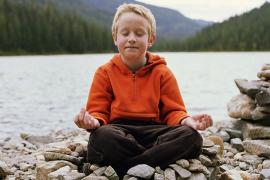As we tackle mental, emotional, and social health (MESH) issues in our programs, we must use every tool possible to help the struggling person. Sometimes, the most powerful tool can be the partnerships that we form with our parents. When strong, these partnerships can yield a support system where risks can be mitigated and the best interests of all can be advanced. However, at issue are the moments where these partnerships are weak or even nonexistent. At these times, we can feel betrayed, vulnerable, and unprepared to help those that need it most. Today’s blog discusses how we can strengthen these critical partnerships.
The camp director had just received word that a young boy who was attending her program had just revealed to his cabin his history of depression and suicidal thoughts and ideations. He was a returning camper and the news had rocked the cabin. The counselors were taken back and were trying to make sense of the situation while also supporting the rest of the group.
The director pulled up the health histories and the notes on the camper and there was no indication of such past history. The parents of the camper were close to the director, so the news was troubling and a bit shocking. Was the story true? If yes, she worried for the health and safety of the young boy, but she also wondered how the camp was in the dark about this. If no, where does a story like this come from? The camp director knew that she had to call the parents.
The call was troubling. Yes, she found out, the story was true. And yes, she learned, the family had failed to inform the camp of this. The mom and dad, by all measures, were safe, loving, caring parents. From her perspective as a camp director, she wondered how they could rationally put their son and the camp in such a risky situation. With a bit of knowledge, they could have been prepared for this moment and been ready to support the boy. The camp director wondered what these parents could have been thinking putting their child in a situation like this.
But to so many parents that choose to not inform their camp about mental, emotional or social health concerns, the choice does not seem as risky. When we wake up in the morning, we do so wearing many hats, but as professionals, we find ourselves in the camp industry. As such, we are constantly thinking about health, safety, wellness, and risk mitigation for our programs and the children, youth, and adults that attend our programs. We worry about liability issues and group dynamics. We are also concerned with site management, human resources, and enrollment. Parents, on the other hand, have their own professional worries, opportunities and stresses, and as a parent, they have the best interests of their child in mind. With differing concerns occupying their minds, it is only logical that we are left to wonder what the other is thinking around this topic.
I spoke with Robbin, a camp alum, a former camp staffer, and a camp board member about this phenomenon. In speaking with her, I was also curious about her perspective as a camp parent. However, Robbin is not just any camp parent: Robbin’s children have attended the camp where she went as a child. Moreover, they have experienced some great "highs" in the experience and some tougher moments, too. In all of those moments, both trying and uplifting, I found her to excel at issues of mental, emotional, and social health of her children.
In speaking with Robbin, it is clear that a parent’s point of view does not always consider the perspective of the camp:
“I think what we as parents are thinking in those moments is all about hope. Those of us who have experienced camp are hopeful that a fresh start might provide a different perspective” for our kids.
She goes on to say, “Some parents fear that in filling out the form with ‘my child has severe social anxiety’ or ‘my child suffers from depression’ that this opportunity to find a nurturing and safe environment for them might hit roadblocks. As parents, all we want to give our children is a chance to succeed and camp offers that opportunity.”
In reality, though, we both recognize that both sides, the camp director and the parent, must come together in true honesty to form the best experience for the child. For the best interest of her children’s emotional well-being and growth, she has engaged in the following partnership tips with her various camp directors. We recommend you share these and articulate them with your families prior to the camp season.
For Parents
- Appreciate that camp directors want the exact same thing as you do for your child during their time at camp: to be nurtured and to grow in a safe and loving environment. When both parties appreciate that the other is on the same page and wants the same things, this common ground can provide a level of comfort for both sides.
- Take all forms seriously. The goal of the form is not to prevent a child from attending, but to make the experience the very best for each and every participant.
- Got questions and concerns? Ask. The partnership needs to be built on open communication.
For Camp Directors
- Appreciate that parents send their child off to camp with so much hope for their time with you. They dream hearing of their adventures conquering new mountains and making new friends. Know they come from a similar place to you.
- Don’t be afraid to ask the tough question. If there is a hint of something you need to dig deeper into to prepare for the summer, do so.
Finally, the partnership is always strengthened when the child gets the opportunity to speak. We must remember that the most critical member of this group is the camper. Consequently, the parent and the camp team should actively engage the child to get their input and make for the very best experience for all.
Tom Holland is the owner/director of Wilderness Adventures in Jackson Hole, WY. He is also the former chief executive officer of the American Camp Association and member of the Healthy Camps Committee.
The views and opinions expressed by contributors are their own and do not necessarily reflect the views of the American Camp Association or ACA employees.



